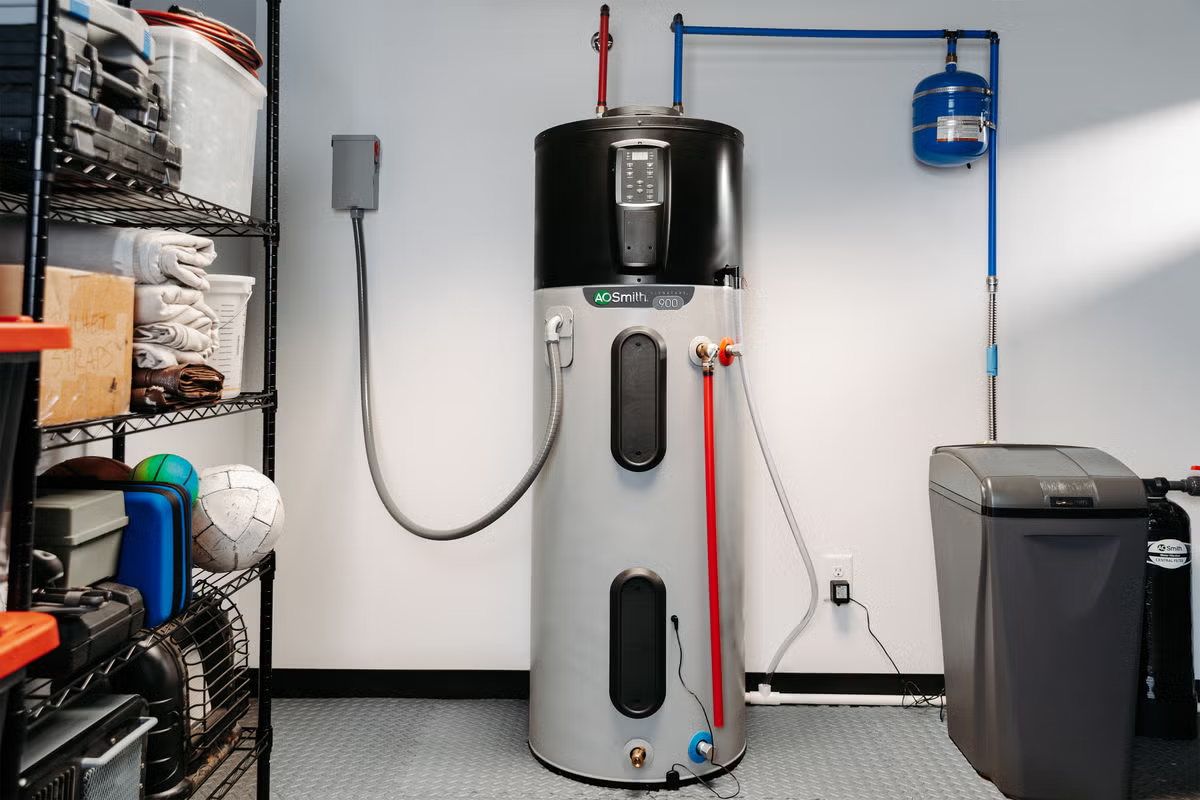Imagine heating your water with the same efficiency as cooling your home on a hot summer day. That’s exactly what a heat pump water heater does—turning modern technology into a practical solution for energy-efficient living.
But what is a heat pump water heater? Unlike traditional water heaters that rely on burning fuel or electric resistance to generate heat, heat pump water heaters work smarter by transferring heat from the air into the water.
Intrigued? Let’s dive into what makes heat pump water heaters so unique, why they’re becoming a popular choice for energy-conscious homeowners, and how they can save you money while helping the environment.
How Does a Heat Pump Water Heater Work?
At its core, a heat pump water heater operates like a refrigerator but in reverse. Instead of pulling heat out of an enclosed space, it extracts warmth from the surrounding air and uses it to heat your water. Here’s a simplified breakdown of the process:
- Heat Extraction: A fan pulls in ambient air from the room, where the refrigerant absorbs the heat.
- Compression: The refrigerant is compressed, increasing its temperature.
- Heat Transfer: The hot refrigerant passes through a coil, transferring heat to the water in the tank.
- Release: The cooler air is then released back into the room.
This process is highly efficient because it moves heat rather than creating it, using up to 60% less energy than conventional electric water heaters. That means lower utility bills and a smaller carbon footprint.
Exploring the Benefits of Heat Pump Water Heaters
Switching to a heat pump water heater offers a host of benefits for both your wallet and the planet:
1. Significant Energy Savings
Traditional water heaters often account for a substantial chunk of your home’s energy use. Heat pump water heaters, on the other hand, consume far less energy by leveraging ambient heat, cutting your energy bills substantially. Over time, these savings can offset the initial investment.
2. Environmentally Friendly
By using less electricity, heat pump water heaters reduce greenhouse gas emissions and your overall carbon footprint. For homeowners looking to live more sustainably, this makes them an excellent choice.
3. Long-Term Durability
Heat pump water heaters are built to last, with many models boasting a lifespan of 13 years or more. With proper maintenance, they can outlive many traditional systems, saving you money on replacements.
4. Added Versatility
Some models come with settings that allow you to switch between energy-saving heat pump mode and traditional electric heating when demand is especially high, ensuring consistent performance without sacrificing efficiency.
How Much Do Heat Pump Water Heaters Cost?
The upfront cost of a heat pump water heater can range between $1,500 and $3,000, depending on the model and installation requirements. While this may seem higher than traditional systems, the savings on your energy bills make it a cost-effective investment over time.
Even better, the Inflation Reduction Act (IRA) provides rebates of up to $1,750 for eligible homeowners to install a heat pump water heater. By taking advantage of these incentives, you can significantly reduce your initial costs while upgrading to a more energy-efficient system.
Heat Pump Water Heater Installation: What to Expect
Installing a heat pump water heater requires professional expertise to ensure it operates at peak efficiency. Here’s what typically happens during installation:
- Site Assessment: A contractor will evaluate your home to determine the best location for the water heater. Heat pump models work best in areas with moderate temperatures, such as a garage or basement.
- Electrical Setup: These units require a 240-volt electrical connection, so your existing setup may need to be upgraded. Thankfully, the IRA also provides rebates for circuit breaker panel upgrades.
- Ventilation Requirements: Proper airflow is essential, as the unit needs air to draw heat from.
- System Integration: The water heater is connected to your home’s plumbing and electrical systems and thoroughly tested before use.
MyNewHeatPump.com works with experienced contractors to streamline this process so you receive the best possible setup while maximizing your rebates.
Comparing Heat Pump Water Heaters to Traditional Systems
Here’s how heat pump water heaters stack up against conventional models:
| Feature | Heat Pump Water Heaters | Traditional Water Heaters |
| Energy Efficiency | High, uses up to 60% less energy | Moderate to low, depending on fuel type |
| Cost to Operate | Lower utility bills | Higher operating costs |
| Environmental Impact | Reduced carbon emissions | Higher carbon emissions |
| Lifespan | 13+ years | 8–12 years |
Heat Pump Water Heater FAQ: Get the Facts
Is it worth getting a heat pump water heater?
Heat pump water heaters are an excellent investment for long-term savings and sustainability. While the upfront cost may be higher than traditional models, their energy-efficient design can significantly reduce utility bills, often paying for themselves over time. Combined with available rebates, they are a cost-effective way to modernize your home and reduce your carbon footprint.
What are the disadvantages of a heat pump water heater?
Heat pump water heaters typically have a higher upfront cost and require more space for proper airflow. They may also perform less efficiently in extremely cold environments, although many models come with backup heating elements to address this issue. Additionally, they can produce some noise during operation, which might be a consideration depending on the placement.
Are there heat pump water heater rebates available?
The Inflation Reduction Act offers rebates of up to $1,750 for eligible homeowners to install a heat pump water heater. These rebates significantly reduce the initial cost, making it more accessible for many households. MyNewHeatPump.com helps homeowners navigate these incentives and maximize their savings.
Do heat pump water heaters work in winter?
While heat pump water heaters perform most efficiently in moderate temperatures, many modern models include backup electric heating elements. These provide reliable hot water even during colder months, making them suitable for a wide range of climates.
Can I install a heat pump water heater myself?
Professional installation is recommended to guarantee proper setup, efficiency, and eligibility for rebates. MyNewHeatPump.com connects you with certified contractors to make the process seamless.
Final Thoughts: Is a Heat Pump Water Heater Right for You?
A heat pump water heater is an investment in both sustainability and savings. It reduces energy consumption, lowers utility bills, and qualifies for generous rebates, making it a smart choice for homeowners looking to upgrade their water heating system.
Beyond the financial perks, these systems contribute to a greener future by significantly reducing carbon emissions. Their innovative technology not only provides reliable hot water but also aligns with modern energy-efficient living standards. Whether upgrading an outdated system or building an eco-friendly home, a heat pump water heater offers long-term value and peace of mind.
Save Big When You Upgrade Your Water Heater with MyNewHeatPump.com!
Ready to make the switch? With MyNewHeatPump.com, you can find out if you qualify for IRA rebates, connect with professional installers, and take the first step toward a more energy-efficient home. Fill out our free questionnaire to get started.


